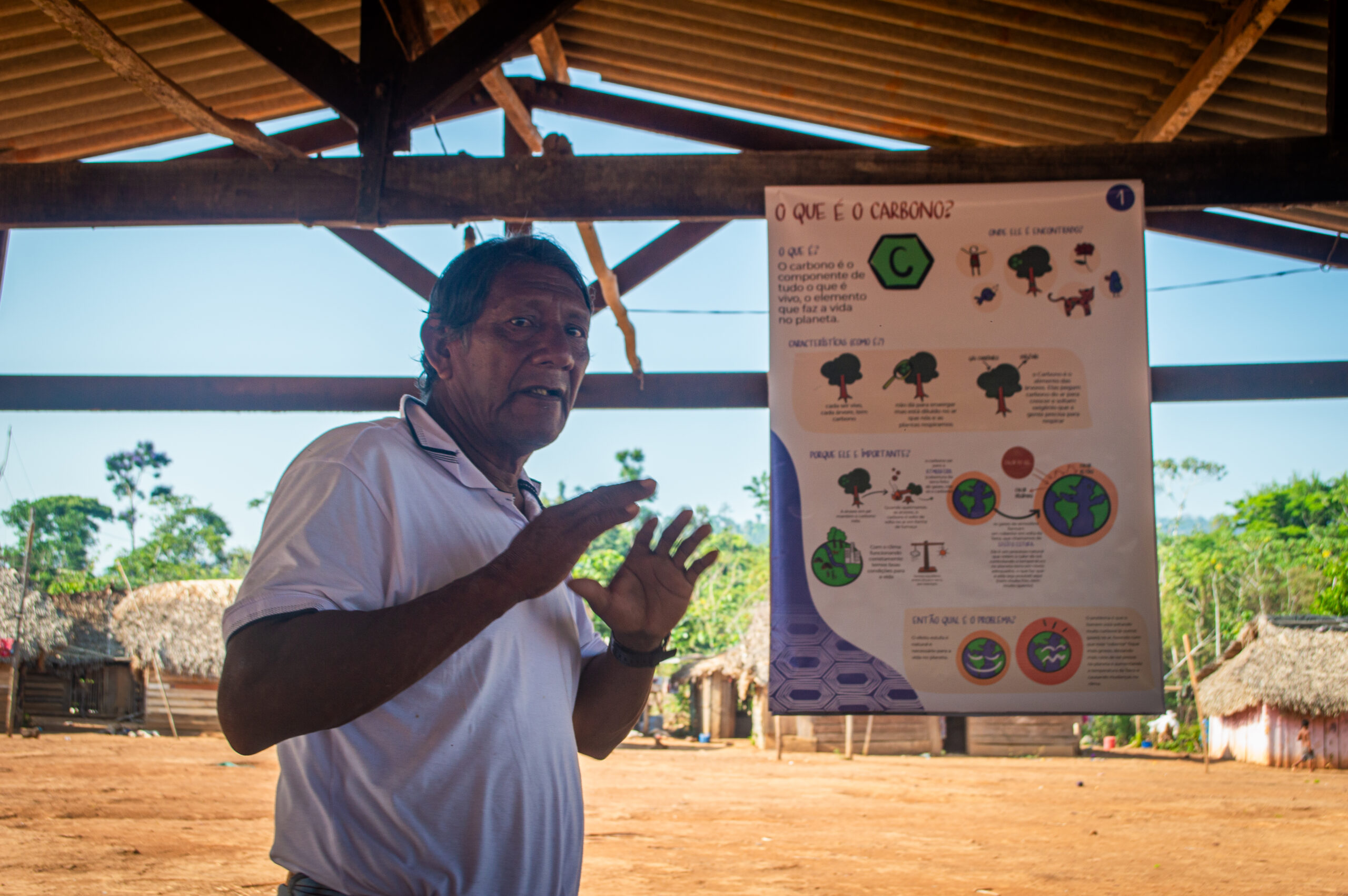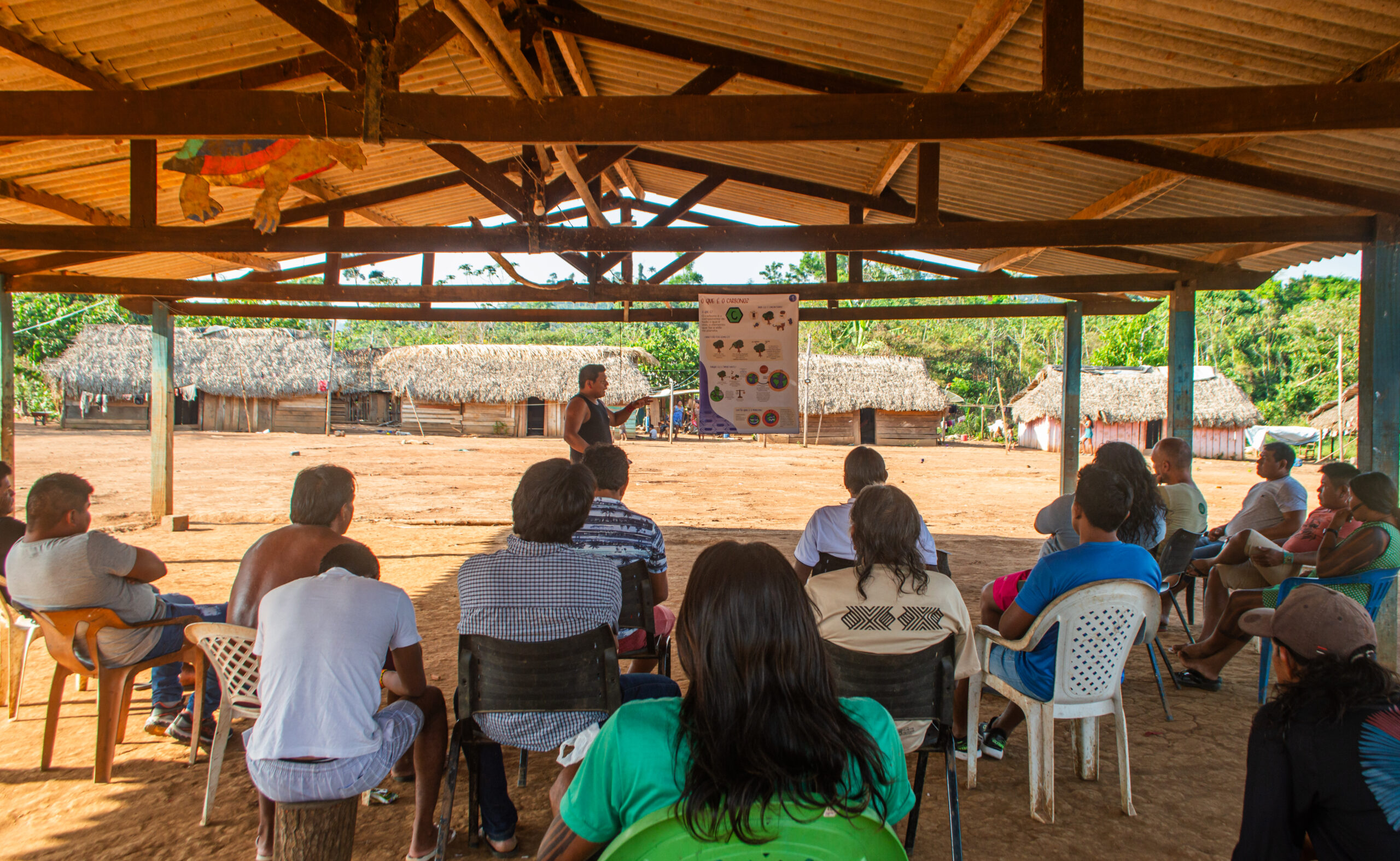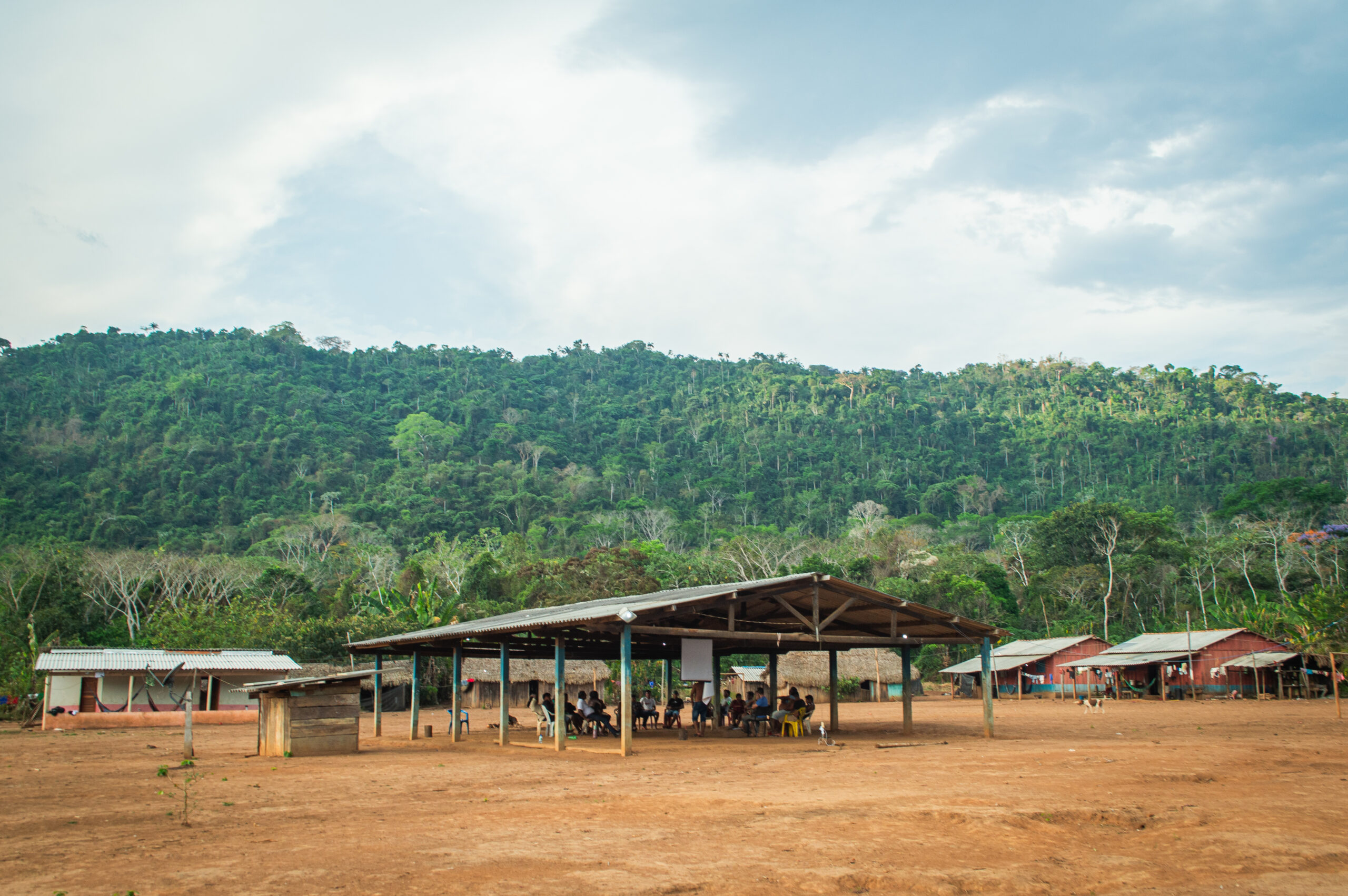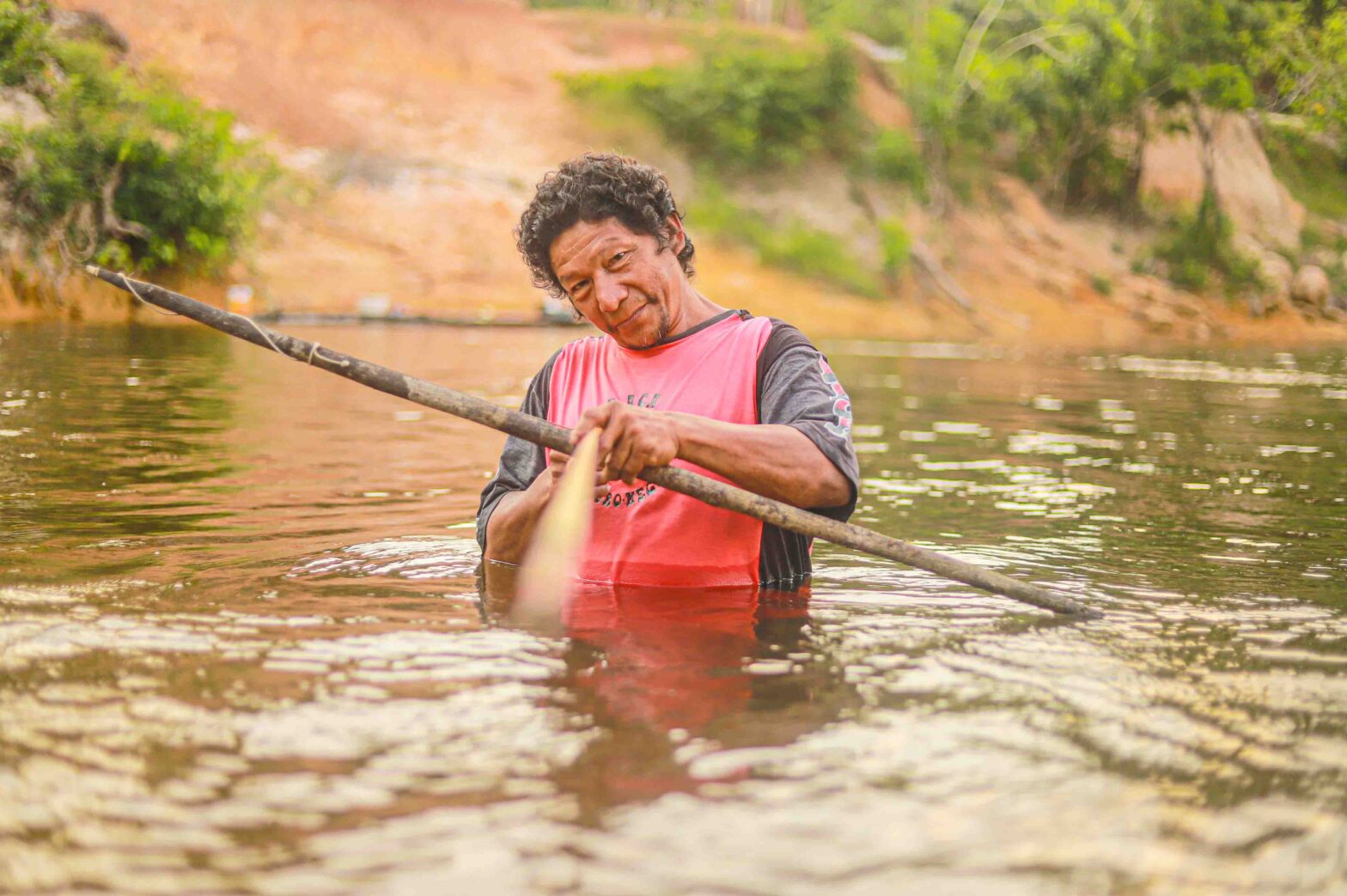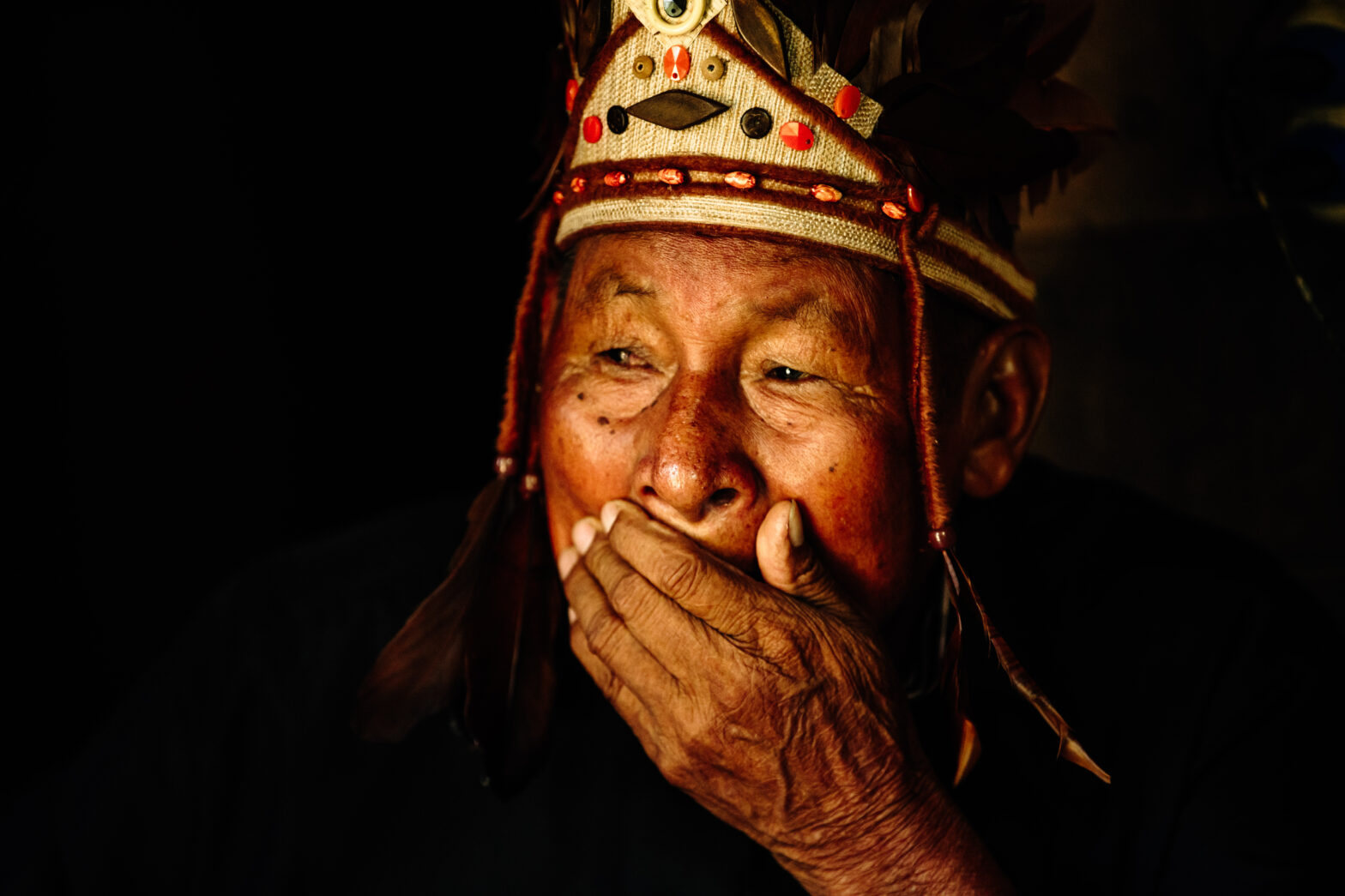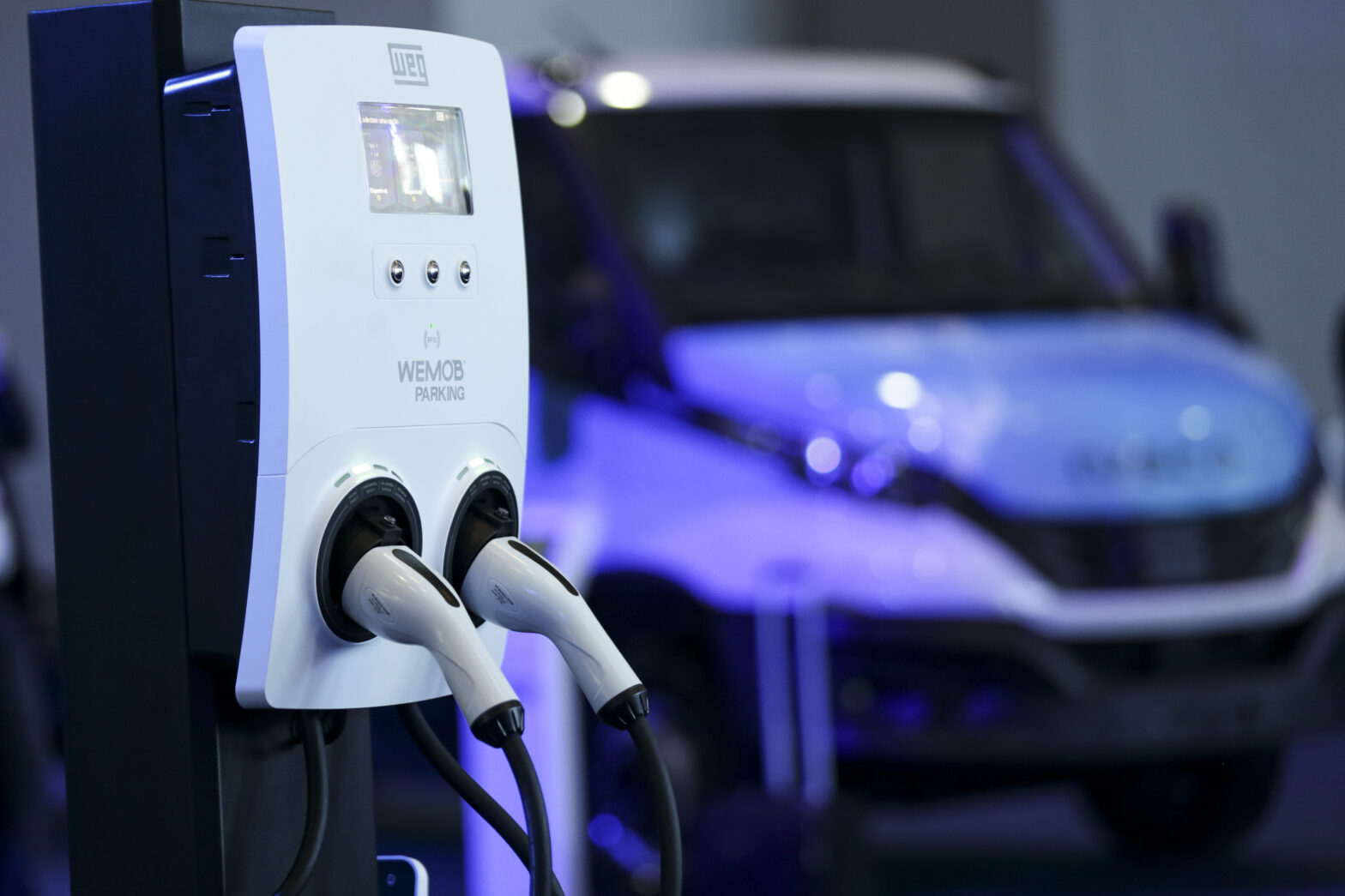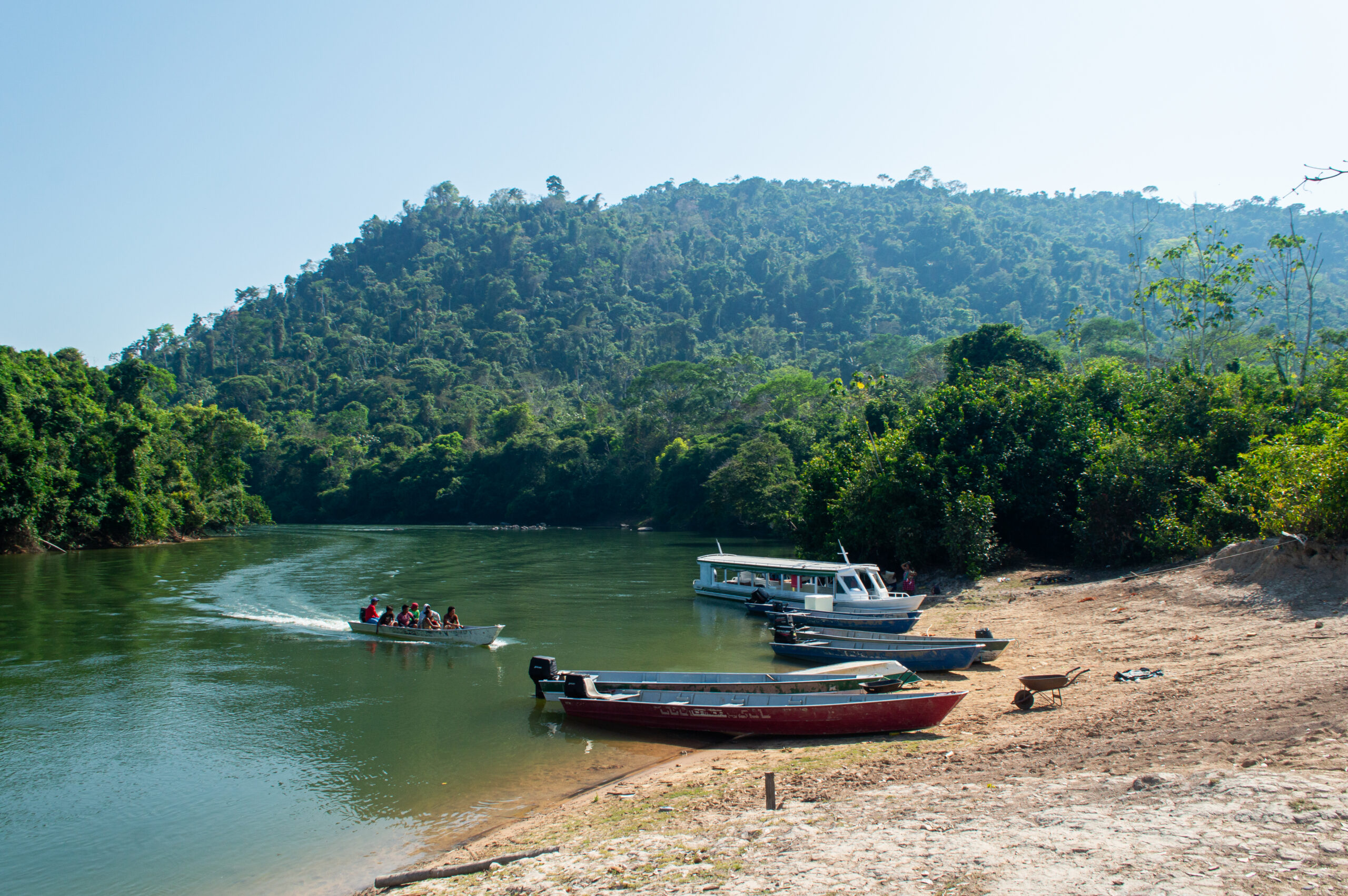
Forest in the Kayapó Indigenous Land, with boats at the entrance of the Pykararakre village. Photo: Ianca Moreira/InfoAmazonia
Carbonext, which is partially owned by Shell oil company, has been accused of having convinced Indigenous people in the Brazilian Amazon to sign documents containing blank pages and of offering front money for obtaining exclusive rights to sell carbon credits in the parts of the rainforest where these peoples live.
Between 2021 and January 2023, Carbonext announced that it had signed contracts inside six Indigenous territories and extractive reserves in the region and therefore intended to more than double the area it previously had in the country for carbon emissions offsetting. These agreements would be part of the largest corporate decarbonization plan on the planet, created by British-owned Shell, which intended to capture 120 million carbon credits per year until the end of this decade — and compensate for about 10% of its greenhouse gas emissions. As part of the program, the oil company invested 200 million reais ($40.5 million) in the partial purchase of Carbonext. “Teaming our company up with Carbonext is an important step in reaching our goal to offset 120 million tons of CO₂ per year until 2030,” the company announced at the time.
InfoAmazonia reporters traveled to the territories targeted by these projects and, over a 10-month period, gathered public documents, records of meetings and interviews showing how the company may have violated the terms of the International Labor Organization’s Indigenous and Tribal Peoples’ Convention (C169) and withheld information from the Indigenous groups to attain these agreements. In addition, Carbonext also ignored recommendations from the Federal Prosecutor’s Office (MPF) at Funai (the National Indigenous Peoples’ Foundation) pointing out the need for federal approval of carbon projects inside Indigenous territories and recommending that Indigenous groups not sign this sort of contract “due to the lack of regulation.”
The investigation of these contracts is part of a series of reports titled “Money that grows on trees: Rainforest financialization puts pressure on Indigenous Territories.” The series focuses on projects inside traditional territories in the Brazilian Amazon that are suspected of illegalities.
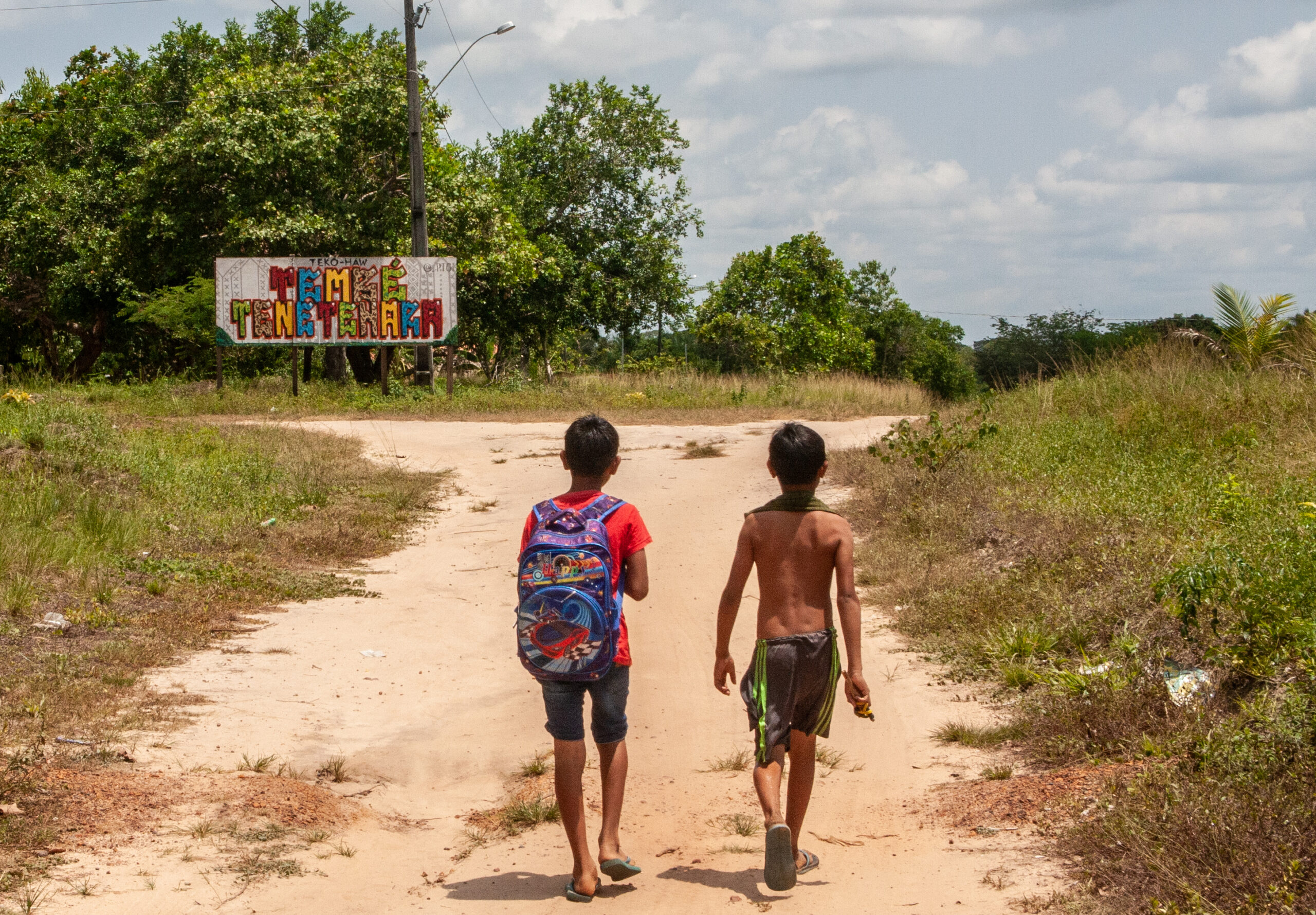
After numerous reports were filed with the MPF claiming that these contracts were signed under pressure and that they disregarded legal norms, Carbonext abandoned the projects. However, the suspected violations involved in these contracts are under investigation by Funai’s prosecutor’s office and the MPF, which are following the cases in extrajudicial proceedings.
If the violations are confirmed, the companies involved may face legal charges to repair any damage caused to Indigenous groups.
Federal prosecutor for the state of Pará, Nathália Mariel, affirms that the same violations were repeated in different regions, building expectations and involving international contracts, and that “this does, in fact, mean that civil and criminal lawsuits are a possibility.”
“The more substantial the arguments showing the violation of prior consultation [rights], the stronger the case from even an international standpoint to show that this type of negotiation is not valid,” affirms Mariel.
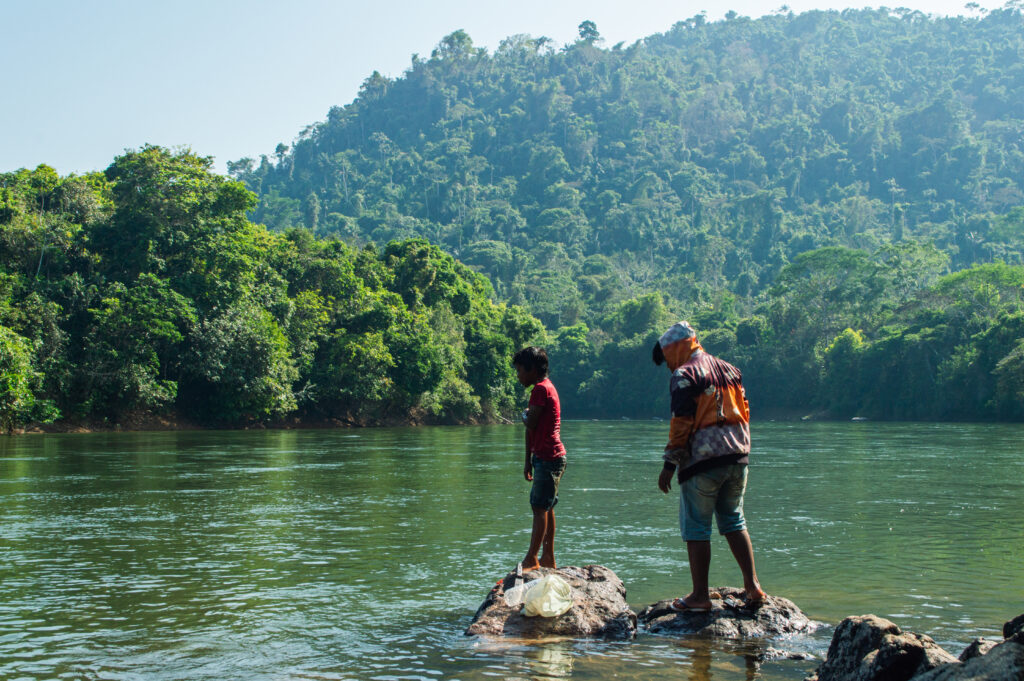
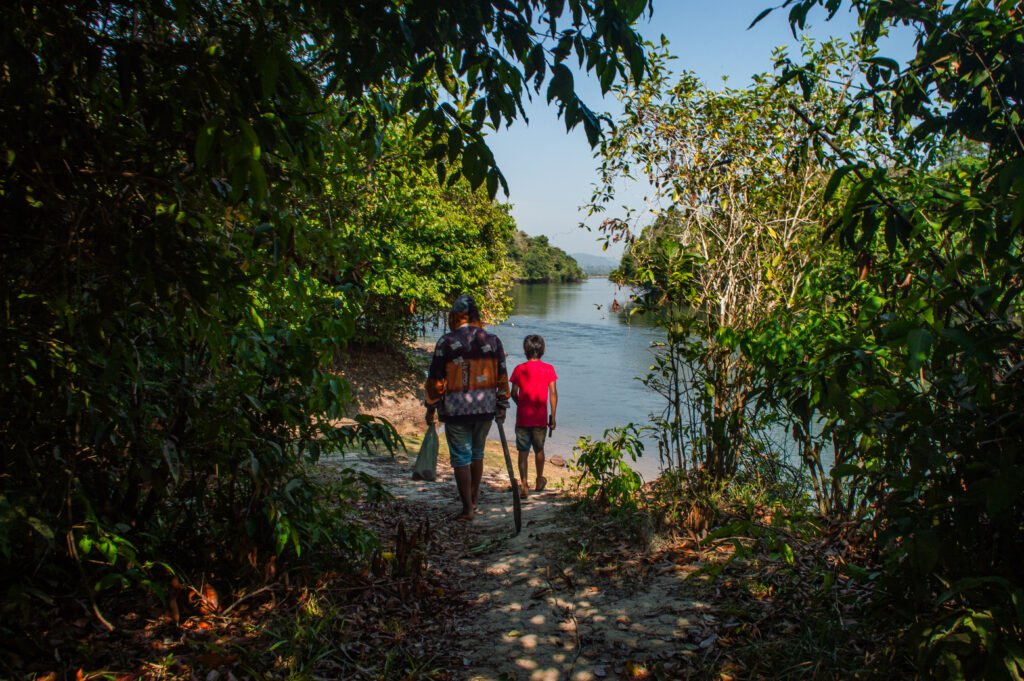
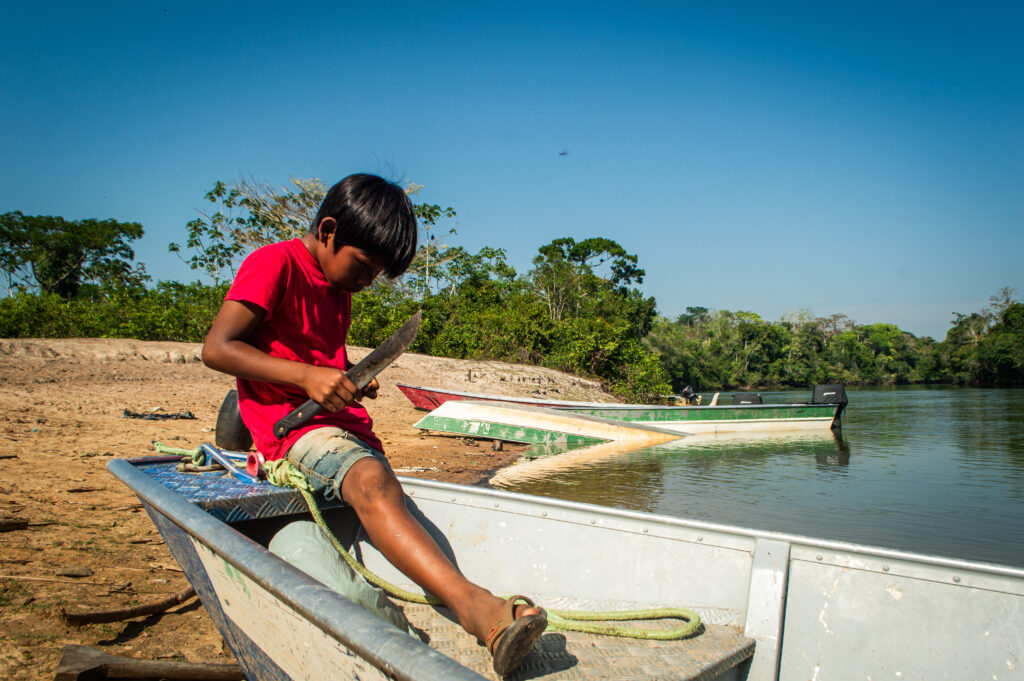
Free, prior and informed consultation (CLPI), stipulated within the framework of ILO-C169, aims to guarantee the territorial autonomy of Indigenous populations and assure their right to be consulted on good faith about any project on their lands, including the right to refuse proposals.
Mariel has been following the administrative case filed against Carbonext inside the Alto Rio Guamá Indigenous Territory in southeastern Pará, where Tembé people were pressured to sign a contract that the prosecutor’s office found to be illegal. According to her, the case is one of those under investigation.
In the first report of this series, we showed the suspected violations of Colombian companies that tried pushing through carbon projects in Indigenous territories in Amazonas. Presigned contracts in these projects involve promises that the money from sales of these carbon credits would finance an Indigenous university.
Signed on a ‘blank page’
In the Alto Rio Guamá Indigenous Territory, the contract for carbon credit generation with Carbonext was signed in meetings where the Indigenous community members say they were unsure as to what they were signing. Some didn’t even speak Portuguese and had difficulty understanding what was said or what the documents contained.
In statements made to our reporters and as stated in the official documents sent to the MPF, Carbonext affirms that the contract with the Indigenous people in the Alto Rio Guamá IT was signed Nov. 16, 2022.
However, according to the minutes of a subsequent meeting, the company continued gathering signatures from members of the Indigenous group at different times after the 16th.
According to a witness who asked not to be identified, during the second meetings between Carbonext and the members of the IT community Nov. 30, 2022, when the contract with the people in Teko-Haw village was being printed, the printer ink ran out and the Indigenous people ended up signing documents with blank pages.
According to the meeting minutes, during the meeting, Indigenous community members “who didn’t sign on another day” were called to sign documents, as one Indigenous leader in favor of the agreement suggested. The meeting, which was initially touted as a presentation of the project, ended with the reading and “signing of the contract,” as stated in the minutes.
Teko-Haw village Chief Carlos Sérgio Tembé, or Karapaí, sat over this second meeting and says that he had not been present at the first, held on Nov. 16 to sign the pre-contract. Kaparaí says he signed the papers but had not understood that this meant he was giving his consent to the project.
“It was the minutes from the meeting, we were signing in our presence at the meeting,” he says. “When we found out [what it really was], we had already signed the pre-contact,” Karapaí tells our reporters as we sit in the shade of the same mango tree where his father founded the first village in the territory. His family had crossed the Gurupí River on the border with Maranhão state in search or forest resources.
Another Indigenous leader, Sérgio Muxi, says that the chiefs signed “blank pages” giving their consent to the carbon project on the Indigenous territory and that it was made official later in a formal pre-contract. “It was the chiefs who signed, right here, on old paper, on blank paper; they just put down their names and that was it. It was not a document, but more like an attendance list that already counted as a pre-contact,” says Muxi, the first community member to be approached by Carbonext. He had been recommended at the time by former Paragominas Mayor Adnan Demachki, owner of the company called Campo Verde, who introduced himself as partner in the Carbonext project in the Indigenous Territory.
cia do projeto da Carbonext na terra indígena.
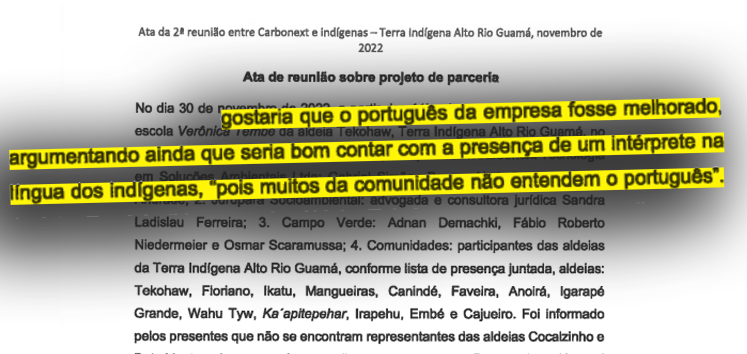
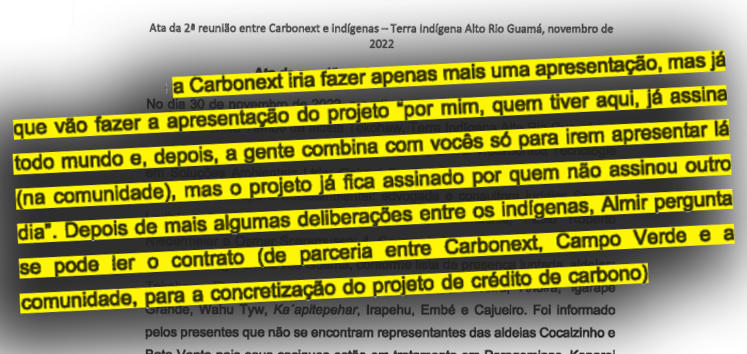
Chief Naldo Tembé of Ituaçu, a village located in a different part of the territory, says he only learned of the carbon project with Carbonext on the IT after the contract had already been signed. “There is not just one group in the Alto Rio Guamá Indigenous Territory, there are two groups. The Federal Prosecutor’s Office called their attention to this and then they came to talk with us. But we didn’t sign any contract with them,” affirms Naldo Tembé.
Prosecutor Mariel says the agreement with Carbonext did not follow adequate protocol. “There was no free, prior and informed consent [FPIC], and the people who signed are not legal representatives for the entire IT. It should not even be considered to be a contract,” she affirms, explaining that the case remains under investigation for possible violations of Indigenous rights.
There was no free, prior and informed consent [FPIC], and the people who signed are not legal representatives for the entire IT. It should not even be considered to be a contract.
Nathália Mariel, prosecutor
In a legal notice, Carbonext denies gathering signatures on blank sheets of paper, stating that everyone signed fully printed contracts “with the participation of representatives of all the communities.”
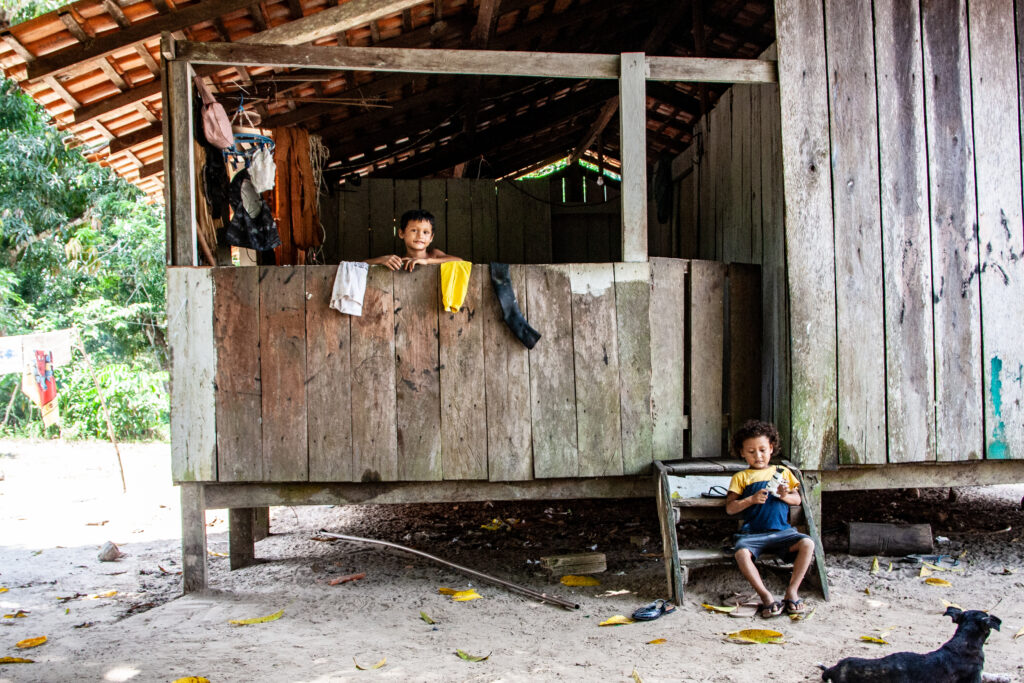
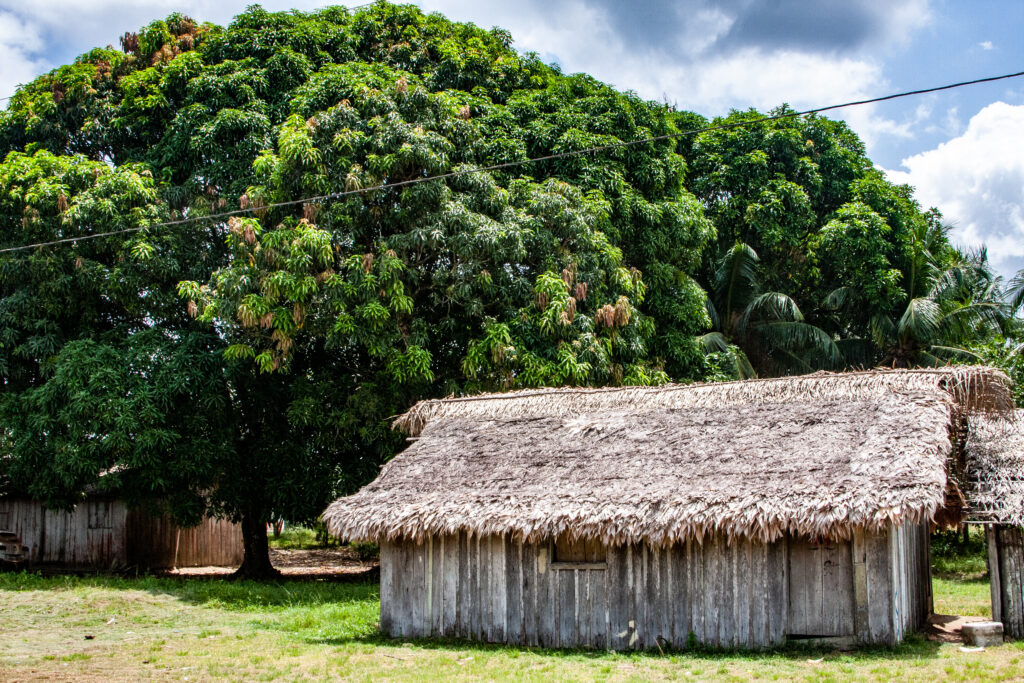
“The information saying that blank pages were signed is entirely false and there are even audiovisual and photographic records of the contract being signed by the community. All this happened after hours of reading and full explanation of the contract, clause by clause,” states the company in its legal notice.
On a video call, Carbonext’s press office shows our reporters photos of members of the Indigenous community signing a document whose first page had been printed, saying they had been taken on Nov. 16, but it was not possible to confirm whether the document contained blank pages and whether the images were of the same meeting that community members had talked about with our reporters. At the time when this article was written, the company was yet to present the authorities with the contract signed by members of the Alto Rio Guamá IT community.
When approached by our reporters, Demachki declined to make a statement.
Village elder Lourival Tembé, father of chief Karapaí, together with most of the members of the small community composed of 78 families, say they knew absolutely nothing about the carbon project, but that they had heard it would be something to protect the forest and bring money to the community.
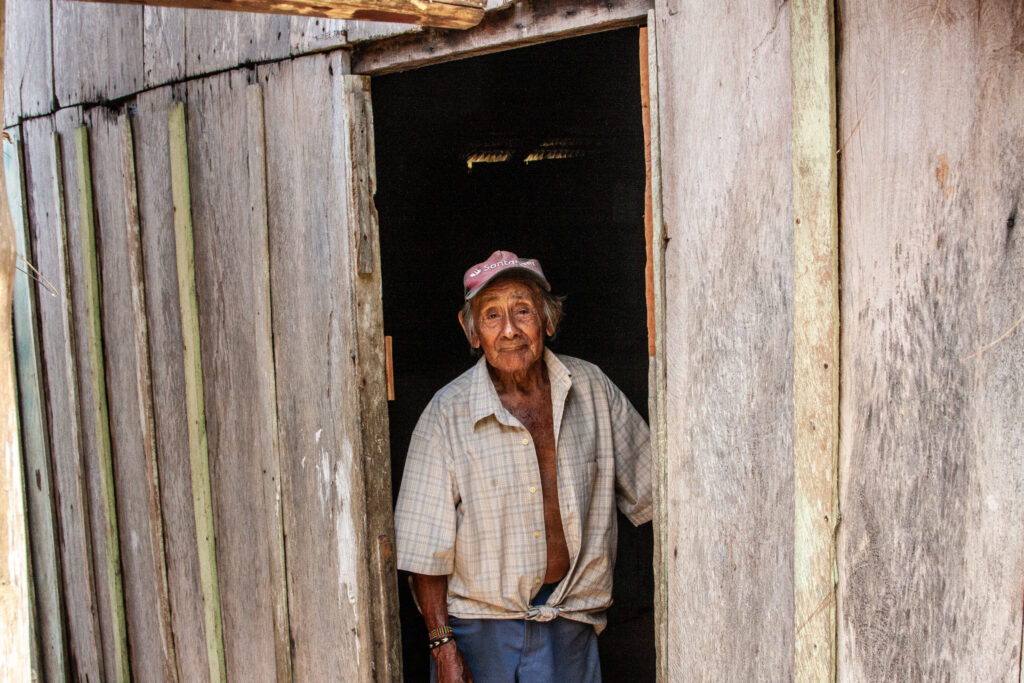
In June of this year, after opening an administrative proceeding to investigate the claims, Carbonext informed the MPF that it had withdrawn from the Alto Rio Guamá IT project, with the justification that “the community had still not uniformly decided whether or not it intends to develop the carbon credit project inside its territory.”
News of Carbonext’s withdrawal never reached the Teko-Haw Indigenous community members, who say they were first informed of the contract’s end by our reporters in August 2023.
The MPF says it will add the information gathered by InfoAmazonia reporters to the investigation and that, despite the requested annulment, the investigation continues.

Funai says projects must have federal approval
Brazil has not developed legislation regarding the carbon market, and the topic is still under discussion in Congress. A technical note emitted by Funai’s prosecutor’s office in 2010 indicates the need for specific definition of carbon credit projects in Indigenous territories and specifically recommends that these contracts not be signed. According to the prosecutors, even though Indigenous peoples have full autonomy, the territories are still owned by the republic, meaning consent of the federal government is obligatory. Despite the fact that 13 years have passed, Funai has maintained that the conclusions specified in the document remain valid.
Carbonext’s projects to generate carbon credits in Amazonia are part of the voluntary carbon market and do not count toward climate accord-mandated targets between nations on the compliance market.
According to Indigenous agency Funai, it knows of at least 33 carbon credit projects in Indigenous territories with at least nine contracts or similarly signed documents. These agreements are currently being analyzed by the state federal attorney’s office “so as to verify their legality and whether or not they contain clauses that can be considered abusive or damaging to Indigenous rights.”
Following the avalanche of new projects, the MPF released a new technical note in July 2023 reinforcing the need for federal authorization and technical regulation. The agency warns that “prior consultation should be carried out in the planning phase and prior to any decisive action.” The note also calls for action to be taken against projects that ignore these guidelines.
“Measures shall be adopted to annul private or administrative acts arising from consultation processes carried out in violation of these human rights,” says an excerpt from the note.
Despite numerous legislative attempts to regulate a carbon market in Brazil, the government decided to present a proposal with the consent of the ministries and which was incorporated as a substitute for federal Senate Bill 412/2022 by the rapporteur of the environmental committee, Senator Leila Barros (PDT).
The text in question establishes that carbon projects on Indigenous territories should respect the ILO’s Convention 169 and include clauses in the contracts that provide for “compensation to Indigenous and traditional peoples and communities for collective, material and immaterial damages arising from [carbon credit] projects and programs.”
Suely Araújo, a specialist in public policy at Climate Observatory and former president of IBAMA (2016-18) says that, aside from establishing clear rules for projects on protected lands like Indigenous territories and conservation units, even on the voluntary market, the state should maintain permanent monitoring.
“It is important that guarantees and transparency are maintained for projects on the compliance market and that monitoring is carried out to assure human rights and consistency within these contracts. The communities do not have the same level of negotiating power as large companies,” she comments.
It is important that guarantees and transparency are maintained for projects on the compliance market and that monitoring is carried out to assure human rights and consistency within these contracts. The communities do not have the same level of negotiating power as large companies.
Suely Araújo, a specialist in public policy at Climate Observatory
In her statement, rapporteur Barros says it is “fundamental that the proposed rules guarantee the rights of the peoples and traditional communities because a large portion of our rainforests occupy Conservation Units for sustainable use and Indigenous Territories.”
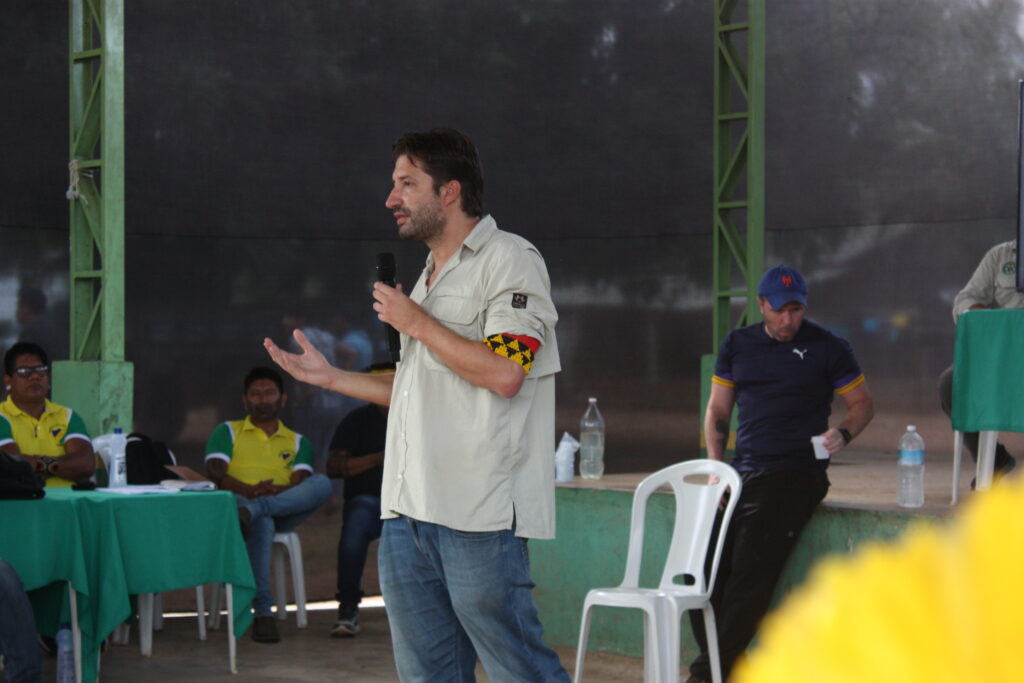
As found in the official documents and statements from the Indigenous communities, all of Carbonext’s negotiations for carbon projects inside the territories were conducted by the company’s compliance officer, Almir Sanches. Aside from reading the contracts, Sanches was also responsible for persuading the Indigenous community to accept the agreements. It was Sanches who held the meeting in November 2022 in Teko-Haw, where the printer’s ink ran out at the time when the contract was to be signed.
As Carbonext’s frontman, according to meeting records obtained from Funai via the Access to Information Law, Sanches told the Indigenous community that consultation, according to the rules in ILO-C169 “is an ongoing process that begins and will be continually developed, in this case, over 30 years”, contradicting the MPF’s understanding that prior, free and informed consultation must occur prior to any decision-making act that could affect the territory.
In addition, the former prosecutor affirms that Carbonext signed a contract on the Coatá-Laranjal Indigenous Territory in Amazonas, where the community was divided. According to Sanches’ account during one of the meetings, “a part of the community gave its consent and the process for consulting and construction of the carbon credit program began,” which is also contrary to full territorial autonomy according to how the MPF oriented.
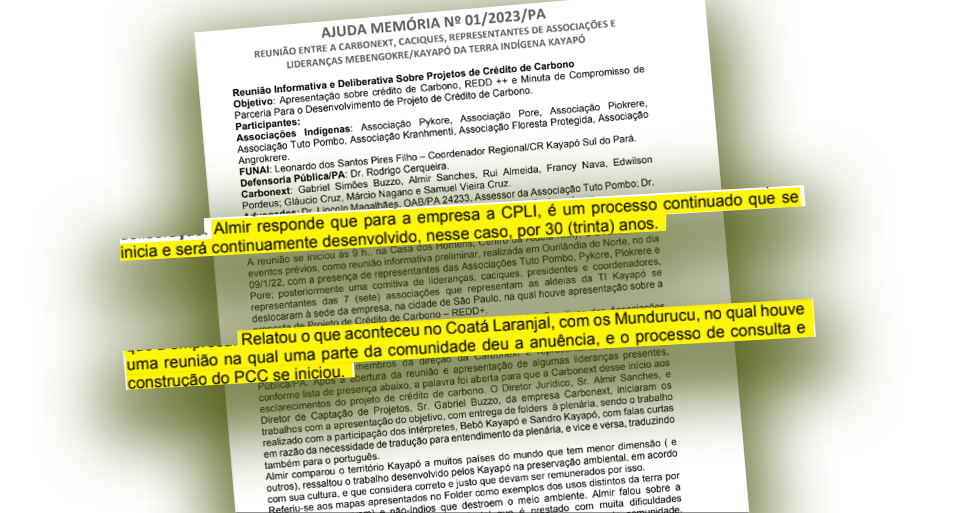
In the meeting with the Kayapó in January 2023, the former attorney spoke of the partnership with Shell and said the multinational had carried out “due diligence” to verify Carbonext’s “competence” for those negotiations: “A multinational company that invests, like Shell, will carry out due diligence to verify the company Carbonext’s competence before it buys a part of it. We think this is good: Shell, looking for clean energy sources, investing in a project with the Kayapó. And Shell is one of the world’s biggest carbon credit buyers,” Sanches declared during the only meeting held on the Kayapó IT, in January 2023, during which the company signed a pre-contract, which is also considered null by the MPF.
We think this is good: Shell, looking for clean energy sources, investing in a project with the Kayapó. And Shell is one of the world’s biggest carbon credit buyers.
Almir Sanches
Sanches also used the lack of basic necessities inside Indigenous communities. In one of his examples, he spoke of the calamity in the Yanomami Indigenous Territory, where people are undergoing a severe humanitarian crisis caused by illegal mining.
“I personally find it absurd that Indigenous communities are unable to generate carbon credits because, historically, they have protected more,” declared Sanches in a video recorded during the meeting.
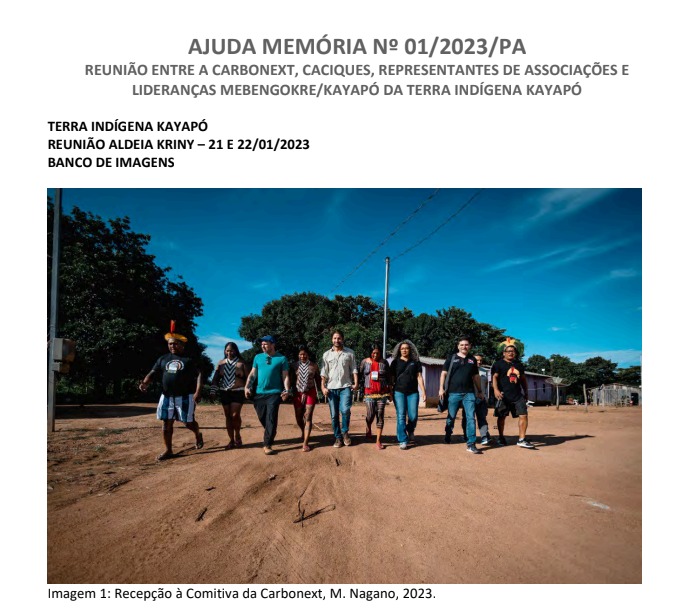
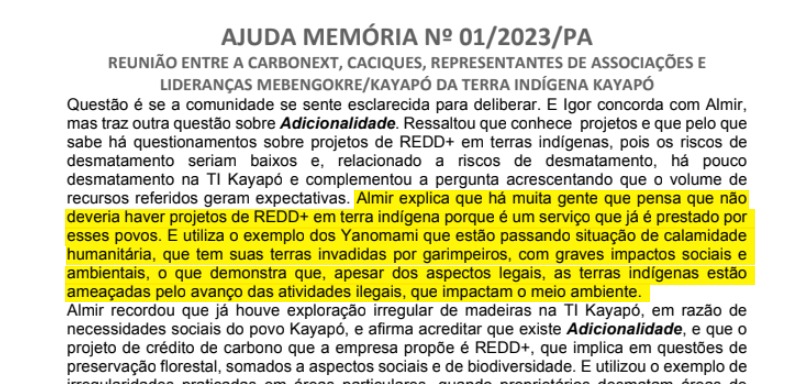
Divide and conquer
According to the Indigenous people, there were doubts regarding signing the pre-contract in the Kayapó IT, and some of them wanted more time to make their decision.
Sanches offered 50 million reais ($10.1 million) as an advance payment for credits the project would reportedly generate in the future. Witnesses say the offer pressured the community members.
The negotiation would be confirmed within 90 days after signing of the pre-contract, as stated in the minutes of the meeting. The minutes also document Sanches saying the company had already spoken to customers who “showed interest in purchasing advance credits from the Kayapó.”
Even though they were divided, in January 2023, representatives of the seven Kayapó organizations signed a contract granting Carbonext “the exclusivity on an irreversible and irrevocable basis for the development of the Project and for negotiation of Carbon Credits and/or other socio-environmental assets.”
“As far as the advance is concerned, my interpretation is that they wanted to persuade the people to accept everything right then. That was my read of the situation,” states Sandro Takwyry, leader of the Angrokrere Association, who acted as translator for the negotiations with Carbonext.
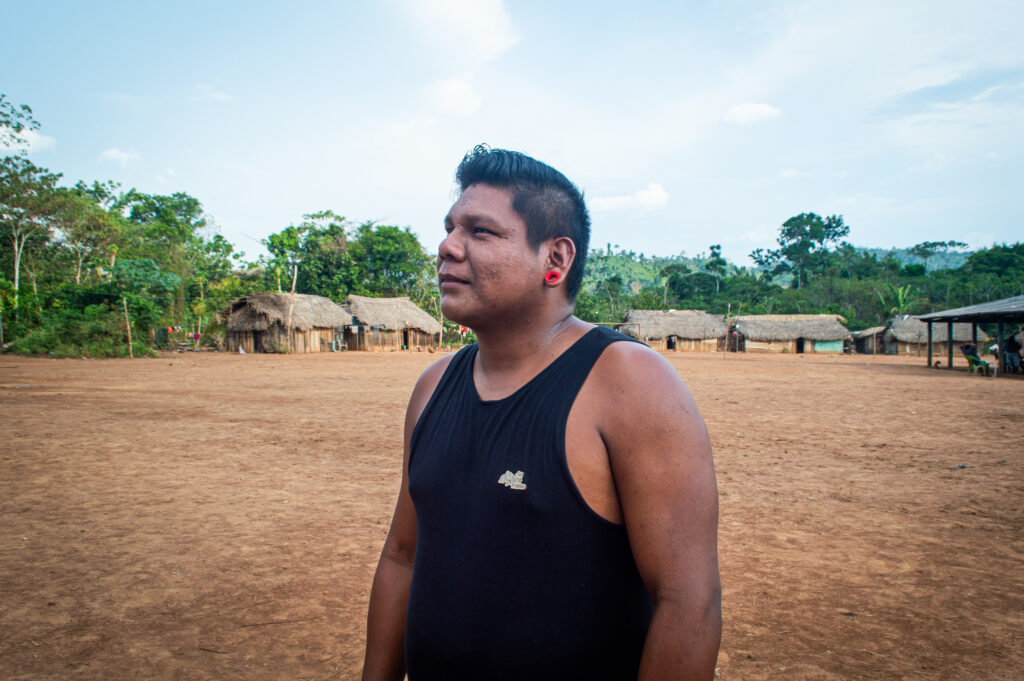
Along those same lines, Indigenous leader Patykore Kayapó from the Protected Forest Association says the Indigenous people were not prepared: “At that time, we needed to better understand just what this carbon business is about. We thought we needed to consult our communities, explain better, to carry out consultation protocol, but the company wanted to sign right away. We did not accept that,” declares Patykore Kayapó.
No anticipated sale of carbon credits whatsoever was spoken of in the agreement signed by the Indigenous people, despite the promises recorded in the meeting minutes.
The payment was never made. Soon after the contract was signed, the MPF filed a notice to investigate alleged irregularities in the Carbonext project plans and the company’s failure to comply with CLPI protocol. Four months after the agreement with the Kayapó was signed, in April 2023, the company signed a cancellation of the terms of the contract with the Indigenous people, with the justification that there could be “unfounded” questions about the consultation.
“The terms of these contracts were not clear. They are territories undergoing problems with invasion and illegal mining. Generating income to maintain standing forest is not a problem, but our concern is with territorial autonomy,” affirms federal prosecutor Rafael Martins da Silva, who filed an administrative proceeding against Carbonext for the contracts signed on the Kayapó IT. Silva also says the same illegalities had been found in contracts that Carbonext had signed with 12 associations of traditional communities to earn carbon credits inside conservation units in northern Pará state. These accords were never put into practice because ICMBio (the Ministry of the Environment’s administrative arm) found the negotiations to have been illegal.
In June of this year, Carbonext announced it had withdrawn from its projects on Indigenous territories, saying there was a risk of reputational exposure.
When approached by InfoAmazonia to make a statement about the issues in this report, Carbonext affirmed that it had withdrawn from the contracts in Indigenous territories because it understood “there needs to be well-defined regulation guaranteeing legal security in order to conduct long-term projects.”
The company denies any illegalities during the consultation processes and says the information about Indigenous community members signing documents that they didn’t understand “is false.” Carbonext says it has in its possession “audiovisual and photographic documentation of the printed contracts being signed by the community.”
“Negotiations with all the communities were conducted with the most absolute transparency, with participation of representatives of all the communities, who received legal consul from professionals of their choosing.”
The company also states that the Public Defender’s Office, the MPF and Funai were all invited to participate in meetings Carbonext held with the Indigenous communities, according to the company, “to certify the seriousness, the transparency and robust nature of the FPIC process that was carried out.”
According to documents annexed to the MPF’s investigations, Funai participated “as an observer” in meetings and “was at no time involved in the worth” of the contracts. The agency tells our reporters, “Funai’s technical orientation is that the sale of carbon credits on the voluntary market is lacking regulation in the framework of Brazilian law, especially when Indigenous territories are concerned.” A technical notice was also emitted recommending “that the Regional Offices not approve projects aiming to sell carbon credits in Indigenous Territories.”
Carbonext affirms that “all documents and evidence listed here may and can be used in future reparation proceedings for possible slander and defamation.” See the full text of the note here.
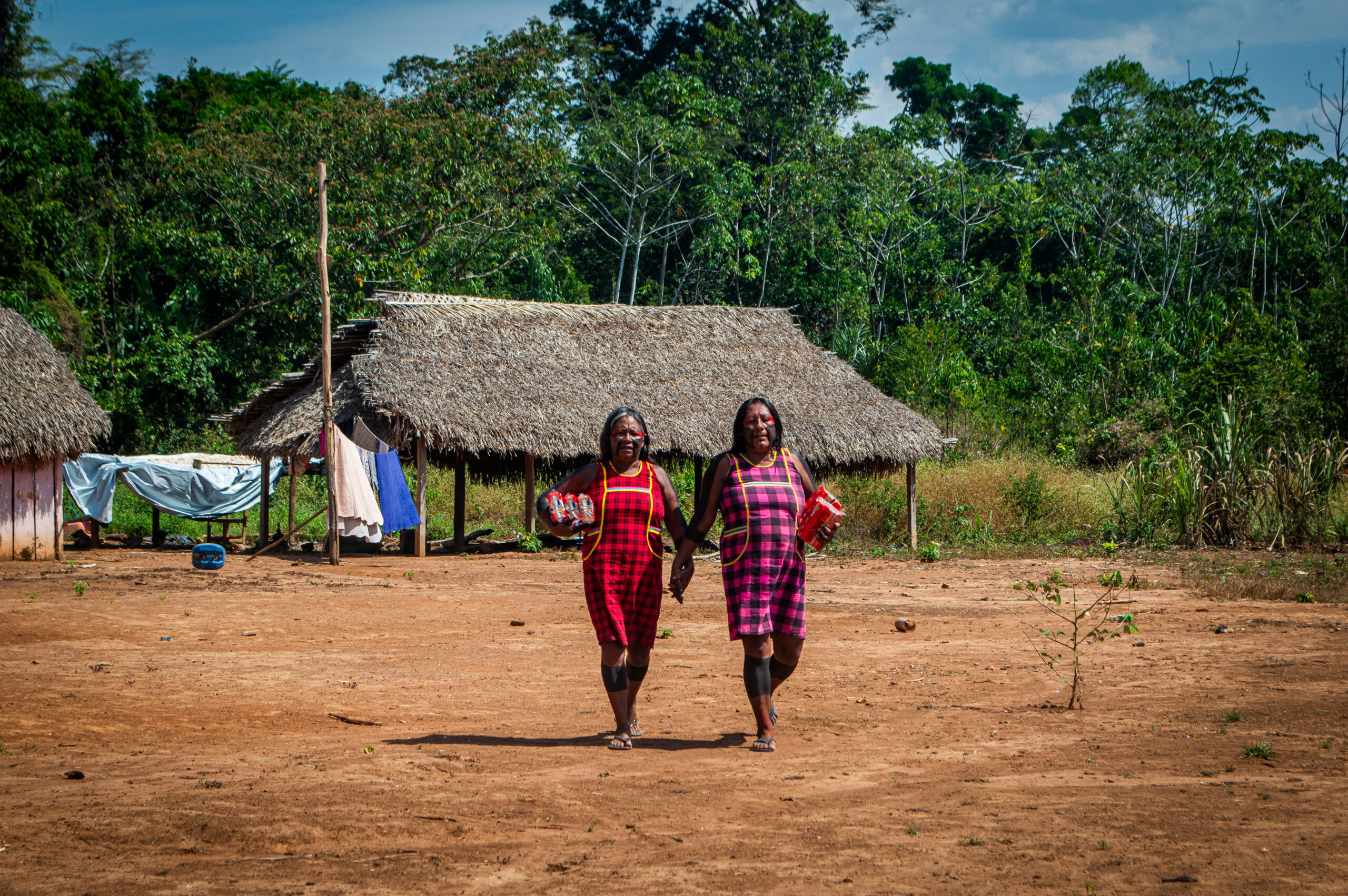
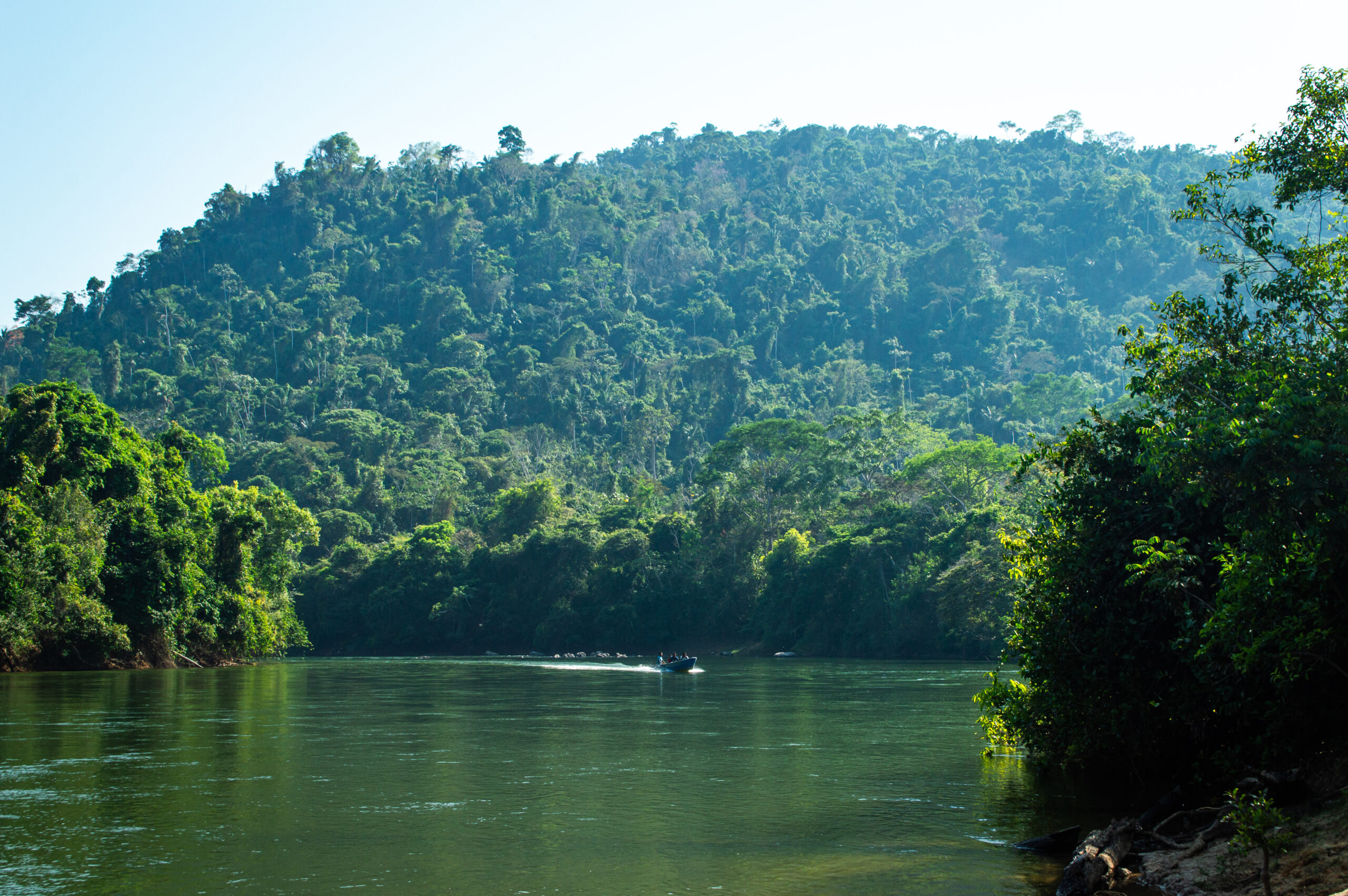
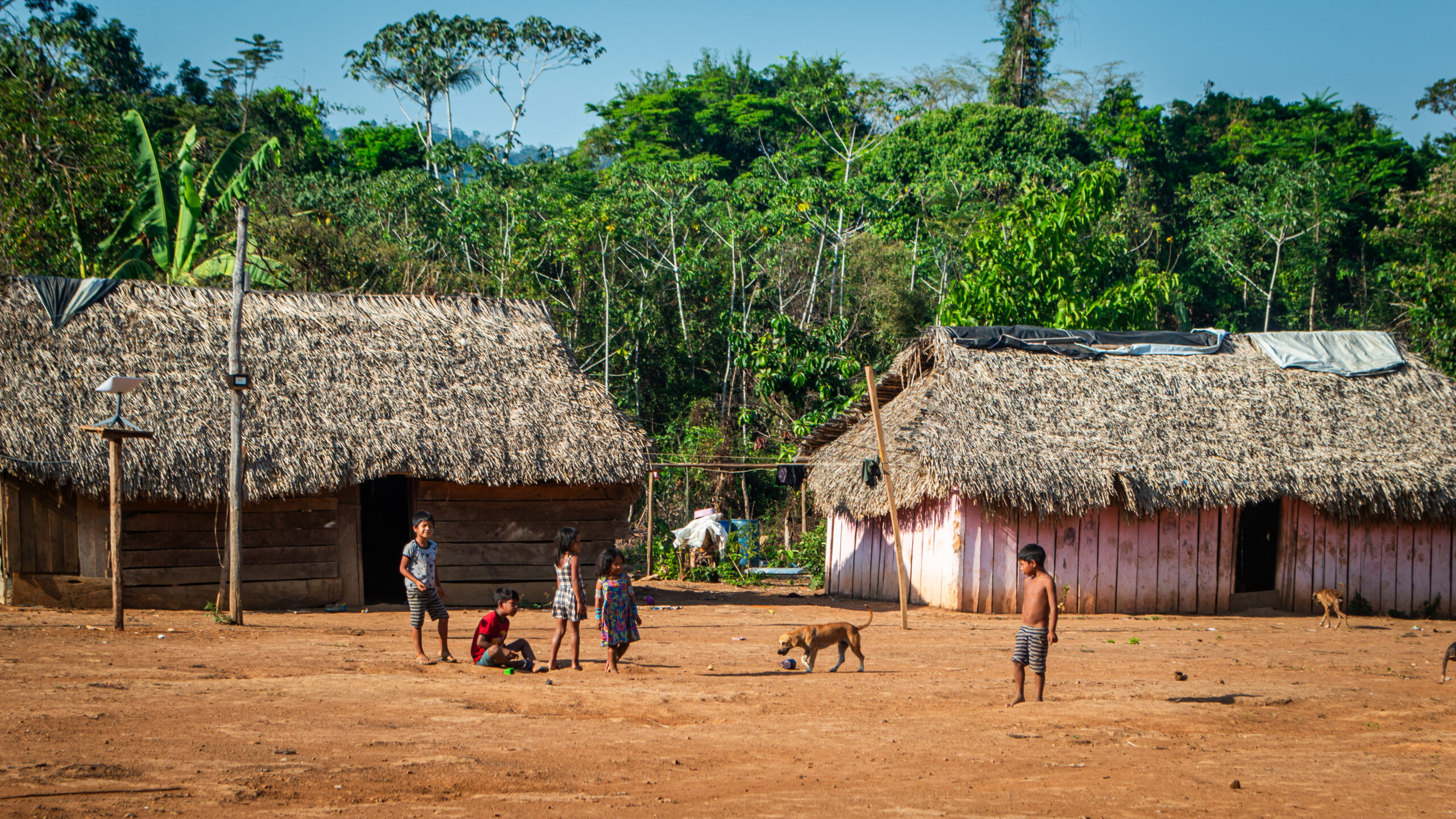
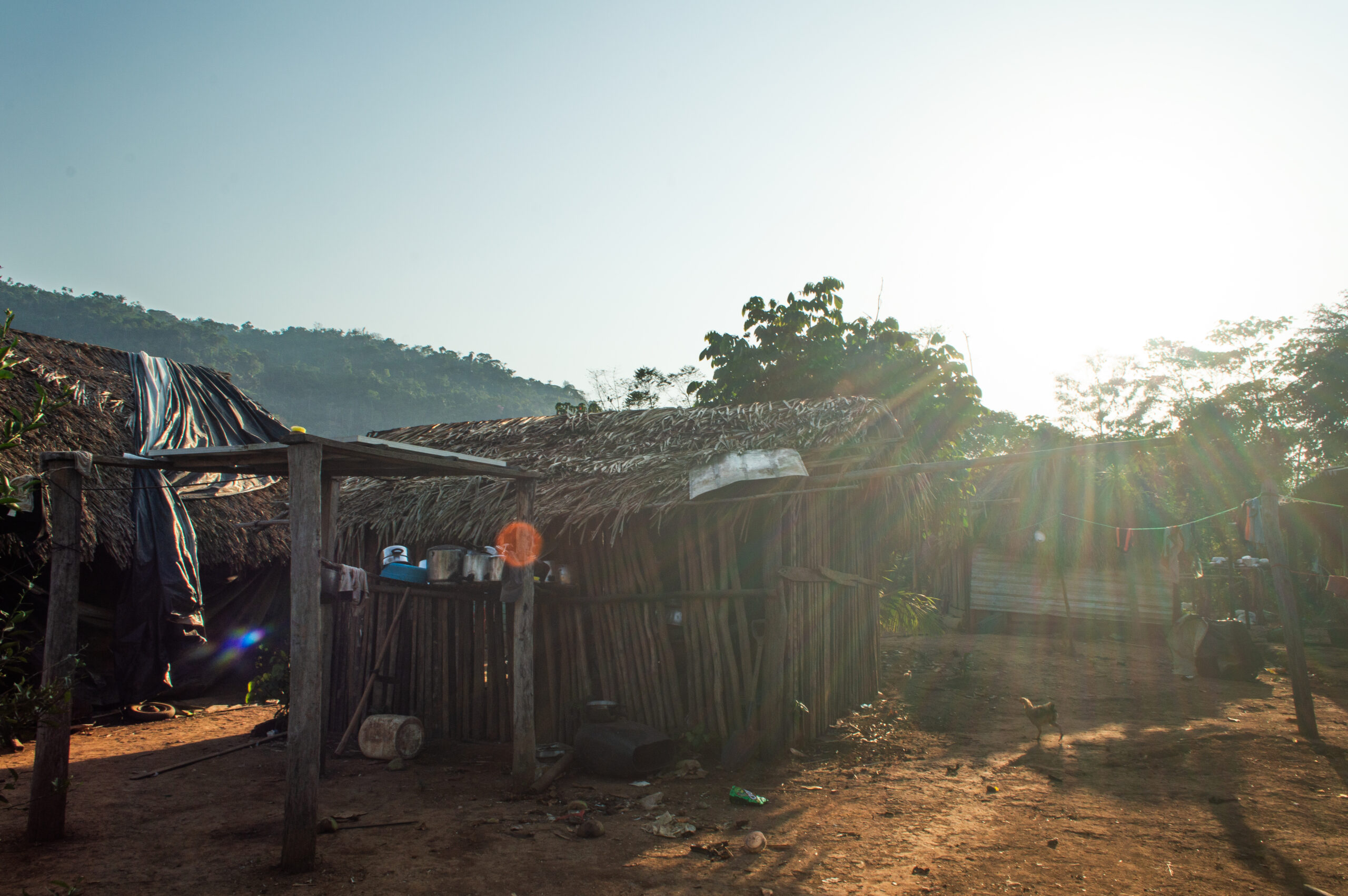
Já a Shell, informou que tem “participação minoritária acionária na Carbonext” e que a empresa mantém “gestão independente, e não há obrigatoriedade de comercialização de créditos de carbono entre as partes”. A empresa não respondeu às perguntas específicas sobre os projetos de carbono apurados pela InfoAmazonia.
A petroleira ainda afirmou que os créditos de carbono “são uma forma importante de suporte à descarbonização de diversos setores da economia e à meta da empresa de se tornar um negócio de energia de emissões líquidas zero até 2050”.
No final de agosto, a Bloomberg noticiou que a Shell desistiu do plano de captar 120 milhões de créditos de carbono, silenciosamente e justificando que as metas eram “intangíveis”.
Ao todo, a Carbonext chegou a anunciar ter projetos para geração de créditos de carbono com seis povos indígenas: os Suruí Paiter em Rondônia; os Cinta Larga e Arara do rio Branco no Mato Grosso; os Munduruku do Amazonas, e os Kayapó e Tembé, no Pará. Todos esses contratos teriam sido cancelados.
Funai prosecutor investigates illegalities
Funai also reported a series of illegalities in the agreement signed on the Kayapó IT, including the lack of a preliminary project and the infringement of powers exclusive to public authorities, such as monitoring environmental crimes, which according to the contract would have been under shared responsibility between the company and Indigenous people.
In March of this year, the agency listed a series of points from the contract and requested that the Specialized Federal Prosecutor’s Office, a legal consulting agency connected to the Federal Attorney General (AGF) to investigate “the possible violation of or threat to Indigenous rights.”
Of the items highlighted, the special investigators emphasized that the 50 million reais offered by Carbonext to the Kayapó people be “analyzed very carefully due to the fact that there does not yet exist a project showing volumes in this initiative that would reach such an end” and points out that the negotiation would be unfavorable to the Indigenous group, which would receive only 30% of market value for the credits.
Funai stated that it is still awaiting a statement from the prosecutor’s office to take appropriate action.
The Kayapó people look at REDD+
The preservation of forests to generate carbon credits is slated within the United Nations Framework Convention on Climate Change (UNFCCC) to financially compensate developing nations for their results in reducing emissions from deforestation and forest degradation in developing countries, the so-called REDD+ projects.
These projects aim to be alternate income sources for Indigenous and riparian communities, as they already preserve their territories though sustainable activity. However, there are still no carbon projects functioning inside Indigenous territories in Brazil to date. The only experiment with accompaniment from Funai happened in 2010 on the Sete de Setembro IT in the state of Rondônia as a nonprofit organization. The project ended after the region underwent a sharp rise in deforestation in 2015.
Since 2022, a new wave of proposed carbon projects in Indigenous territories has emerged in Amazonia, mostly due to the announcement that many large corporations are interested in offsetting their emissions with credits from these projects.
This has created new expectations that the people who really preserve the rainforest may be compensated for their environmental services.
In August of this year, our reporters accompanied Patykore Kayapó in a series of organized workshops held in Kayapó territory dealing with carbon projects. The goal is to introduce the topic within the communities.
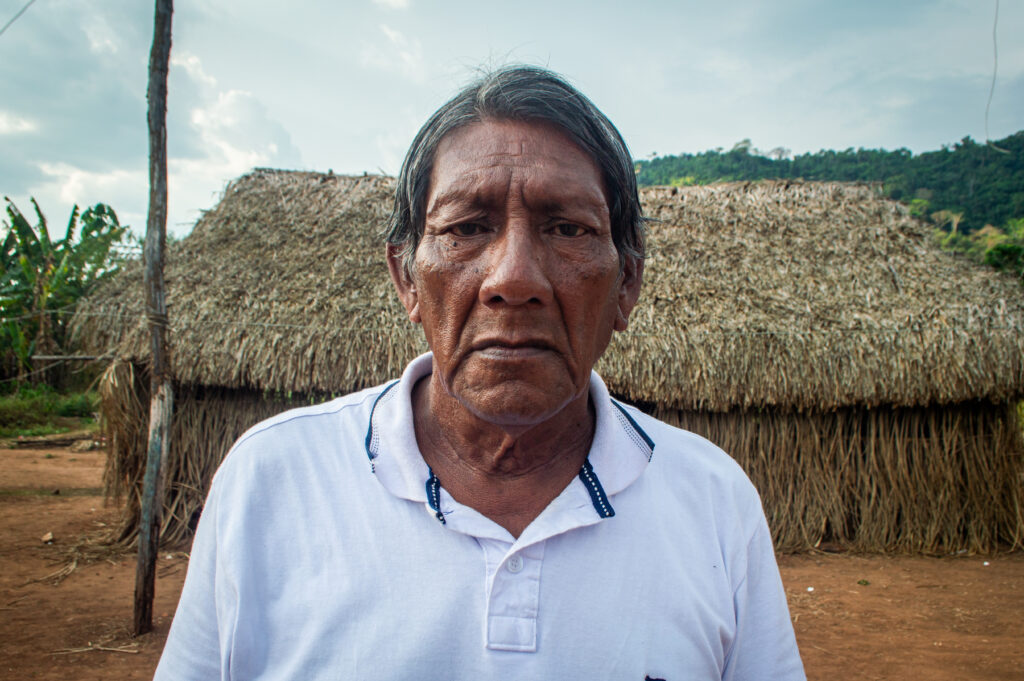
The forest is our life. Without her, we are nothing.
Mundico Kayapó, from Crocraimoro village
Through these meetings, the Kayapó are gradually coming to understand the meaning of previously unfamiliar concepts like “emission” and “global warming” and learn how the forest sequesters carbon when it is alive and how it releases the element by means of toxic gas when it is burned.
“The forest is our life. Without her, we are nothing,” Mundico Kayapó, who lives in Crocraimoro village, tells our reporters. He was one of those most engaged in the workshop.
The communities are hearing about this carbon credit system but don’t know what it is. We are coming to understand it together so we can deal with it better in the future.
Patykore Kayapó
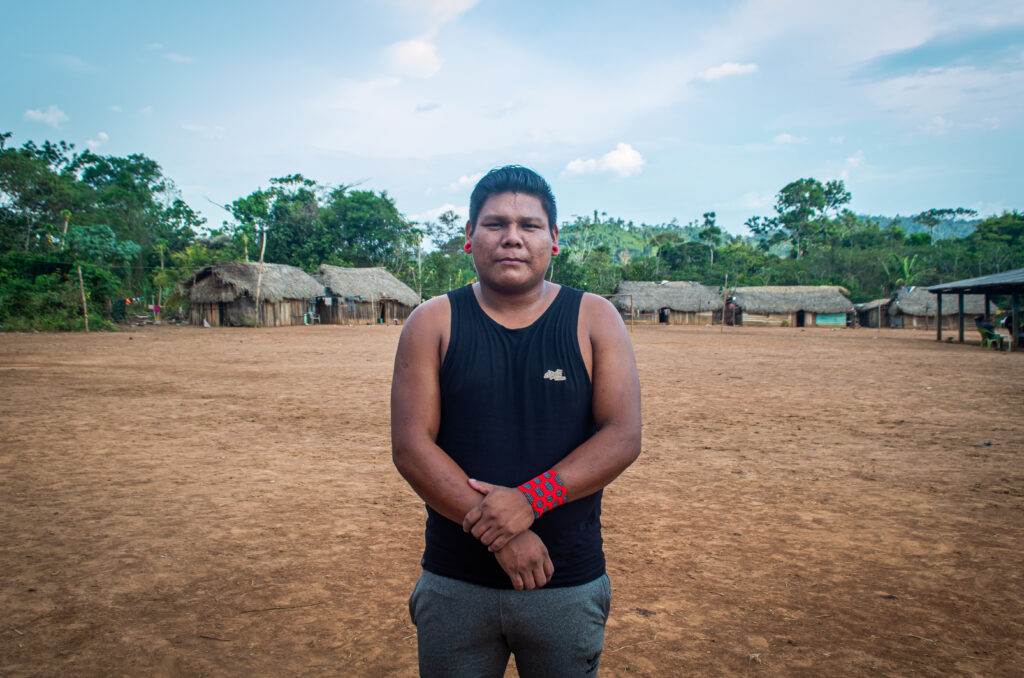
The conversation is slow and calm, in the same language in which they came to know the world, with the same tempo and wisdom with which they relate to the forest.
“The communities are hearing about this carbon credit system but don’t know what it is. We are coming to understand it together so we can deal with it better in the future,” affirms Patykore Kayapó.
This article is part of the series “Money that grows on trees: Rainforest financialization puts pressure on Indigenous Territories”, produced by InfoAmazonia, with support from Journalismfund Europe, via Report For The World, and a partnership with Mongabay.


